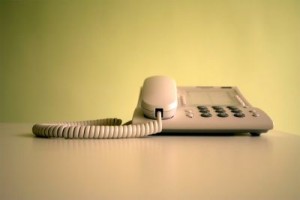Just the other day, I received quite the happy e-mail. It was from an employment agency, specializing in the creative fields, through which I had applied to two permalance editor gigs. They thought that my work was “dead on,” and were wondering if I would be around that afternoon for a phone interview. After doing a happy dance, I responded that I would be home all day long, and then set up drawing up some notes, based upon questions they might ask me.
While I was in the midst of this, I received a response to my response. [Agency Guy] will be calling you shortly.
Crap.
I was unprepared. I was straight out of the shower, and with a head of wet hair, which wasn’t the most comfortable feeling in my chilly apartment. And I already knew that phone interviews weren’t my strong suit. (Speaking in general isn’t my strong suit; that’s why I became a writer.)
Of course I was dissatisfied with the course my phone interview took. How could I not be? What should I have done to ace that interview?
Prepare for Possible Questions:
My first instinct was to draw up notes based upon what they might ask me, and it was a good instinct. Unfortunately, I didn’t have the chance to get very far with my notes and, by giving my agency contact the go-ahead to call me at any time that day, I didn’t feel comfortable asking them to call back later. (Talk about foot-in-mouth.) Assuming you have the time, do some brainstorming on the topics that could possibly be covered during the course of your interview, and then jot down some awesome answers, so that you’re not left hemming and hawing and stuttering. You should also remember to include questions that you’d like to ask your interviewer.
Have Resources at Hand:
When submitting to a phone interview, I like to be within a few quick paces of my computer, where I’ve already pulled up my resume and professional site (with clips) beforehand. That way, I have a quick reference to look to if an interviewer wants to know details about responsibilities, time lines, etc.
Take Notes:
I always make sure to have a notebook and pen at hand during interviews, whether on a phone interview, in-person job interview, or informational interview. In person, it shows thoughtfulness. Wherever you are, I find it helps to jot down the especially important points an interviewer is telling you about a position, so that you don’t repeat questions later on, leading to the impression that you’ve been inattentive.
Take Your Time:
Dead air over a phone line can be terrifying, but it can be even worse to rush in and fill that dead air if you’re not completely ready with an articulate answer. Pause to collect your thoughts before answering any question. You may think that a pause would be a sign of uncertainty but, when you’re brain can’t keep up with your mouth — or vice versa — a pause can only make you look better. Again, it will come off as a sign of thoughtfulness.
Loud, Clear, and Slow:
This is the lesson from my junior high history teacher that I’ve never forgotten.
Well…sometimes I’ve forgotten in the heat of the moment, but this amnesia is temporary.
Repeat these words to yourself, and they will effectively rein in any runaway verbal trains.
…
Aside from these more technical tips, remember to always be confident. In the midst of acting confident, I’ve often convinced myself that I actually am.
Related: Product Placement: Audio Recording + Transcribing Resources, Product Placement: The Flip Mino, When Interview Subjects Go AWOL, Why It Helps to Review the Basics, Informational Interviews: Just Like the Real Thing


[…] I’ve mentioned it before. Don’t let your nerves get the best of you. Be loud, clear, and slow. […]